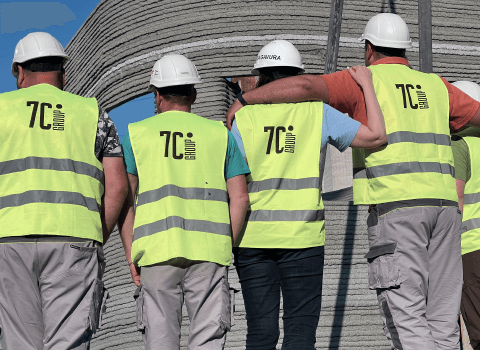
Results of EDO implementation over 12 months

The key factor that forced us to abandon paper documents
![]() Every month, 7CI Group processes about 500 documents — contracts, expense reports, work completion reports, etc. The greatest need was to quickly draw up and receive signed contracts. Usually, the process of drawing up a contract and exchanging the originals of signed documents took up to two working weeks.
Every month, 7CI Group processes about 500 documents — contracts, expense reports, work completion reports, etc. The greatest need was to quickly draw up and receive signed contracts. Usually, the process of drawing up a contract and exchanging the originals of signed documents took up to two working weeks.
It was quite common for paper documents to be drawn up with errors or lost in transit, and sometimes even on site.
When the accounting department discovered that some copies were missing, a long process of communication began to restore them: calls to suppliers, clarification of reasons, requests to send duplicates. As a result, we lost time and resources.
However, the turning point came in 2022, when the full-scale invasion began. Our employees were not always physically able to be where they needed to be to receive or sign documents. And in general, we realised that it was time to become faster and more flexible in doing business.
How did you work with documents before?
Previously, document flow at 7CI Group was entirely paper-based. Our central office is in Kyiv, but our facilities are located throughout Ukraine, so document logistics were complicated.
For example, materials were delivered to the site along with accompanying documents, which were handed over to the contractor. The contractor signed only the supplier’s copy, which is usually a transfer invoice (not an expense invoice confirming the final receipt of the goods).
Two copies of the expense invoice, together with the commercial consignment note set, are sent to the accounting department by Nova Poshta without signatures.
The accounting department receives stacks of such documents and checks them for compliance: whether there was indeed a corresponding order, whether the exact materials were received, etc. After that, the documents are sent to the responsible person for signature.
After signing, the documents are returned to the Kyiv office. Here they are sorted: one copy remains with us, and the other goes to the supplier. The copy for the supplier is handed over to the clerk, who prepares the parcel and sends the documents by Nova Poshta or Ukrposhta.
In general, the full cycle of signing one such document at 7CI Group took more than a week.
Why did the company choose Vchasno.EDO?
We considered several providers of such services. We chose Vchasno because a large number of companies (including our contractors) already use your solution. Working in a single system greatly facilitates interaction with them.
About the start of the transition to EDO
 We started this process in 2024. April 2025 marked exactly one year since the start. At first, we familiarised ourselves with the capabilities of the service, configured internal processes, and gradually prepared for the transition. The preparatory phase lasted from April to July: we tested the system, trained employees, and informed our contractors that we were going to completely switch to EDO.
We started this process in 2024. April 2025 marked exactly one year since the start. At first, we familiarised ourselves with the capabilities of the service, configured internal processes, and gradually prepared for the transition. The preparatory phase lasted from April to July: we tested the system, trained employees, and informed our contractors that we were going to completely switch to EDO.
Full-scale electronic document exchange at 7CI Group began in July. From that moment on, we began to gradually increase the volume and coverage. The transition was gradual and well thought out — the first few months allowed us to identify areas for growth, adapt processes, and understand how to work most effectively.
More details about the transition to Vchasno.EDO
When we first started transitioning to Vchasno, we began by describing our business process. We specified who should be involved at each stage, how much time each action takes, and who is responsible for what, since we use approval scenarios.
After that, we conducted training for all users in the company. Our Vchasno manager, Nazar Zimenko, actively helped us, so the launch went smoothly.
One online training session was enough for all users to be able to work with the service to its full potential.
1Currently, 30 employees work in the Vchasno.EDO office, and we are constantly adding new ones, as the number of objects is growing. On average, we connect two users every month.
These are not only 7CI Group office workers — employees from the regions and production facilities are also involved. They are the first to see what has arrived and can confirm the receipt of materials or the completion of work. They are the first link in the chain to process the document.
How did you inform your contractors about the transition to EDO?
We tried to reach all of our suppliers and inform them about the changes. We sent everyone emails informing them about the transition to electronic document management. We also added a note to each paper document stating that we would soon be working with documents only in Vchasno.
After a year of experience with EDO at 7CI Group, about 50% of our contractors also started using EDO and working with us in Vchasno.

Why are counterparties reluctant to switch to EDO?
The main reason is the lack of paper documents in their hands. Some people are simply used to working the old way and do not trust the electronic format. We actively communicate with our partners and explain the advantages: speed, convenience, minimal risks. And we prove that electronic documents have the same legal force as paper ones.
We believe that we will be able to convince the majority. Perhaps not 100%, but by the end of 2025, <strong>we plan to transfer at least 80% of our counterparties to EDO.</strong>
What difficulties arose during implementation?
In general, 7CI Group did not encounter any serious difficulties. For some time, employees were getting used to the interface and the logic of the filters. Sometimes minor technical issues arose — for example, when hovering the mouse over a document type (such as ‘expense invoice’), the filter was automatically activated.
Because of this, some users did not see the full list of documents for approval and did not immediately understand the reason. But these issues were quickly resolved: employees learned how to check and configure filters, so the work became completely understandable and logical.
How do you approve documents between departments at 7CI Group now?
The document approval process consists of several stages and depends on the type of document. For example, if it is an expense invoice, the approval scenario looks like this:

- The clerk determines which object to send it to and which approval scenarios to apply.
- Production checks the actual receipt of materials or completion of work.
- The project manager approves the document.
- If the amount exceeds the internal limit, the document is also approved by senior management.
- After approval, the document is sent to an authorised person for electronic signature.
- When both parties have signed, the accounting department completes the processing.
At Vchasno, we use a ‘processed/unprocessed’ filter, which allows the operator to see which documents are still being worked on and which have already been completed.
If it is a contract, then there is a different scenario — the contractor is not involved, but a lawyer is.
- The lawyer initiates the approval process, uploads the contract, and sends it to the responsible persons.
- The approval process goes through: the lawyer, the project manager, and the project supervisor.
- After that, the document is signed.
Due to the large number of objects, the responsible persons may change — they are not assigned to specific departments.
Signing documents at 7CI Group: before and after the introduction of electronic document management
| Stage / Indicator | Paper document flow | Electronic document flow |
| Average document processing time | 10+ days | 1 day (if there are no delays) |
| Minimum possible signing time | It is impossible in a short period of time | 10 minutes (in urgent and simple cases) |
| Dependence on location and mail | High: By Nova Poshta, Ukrposhta | Not available: everything is in electronic format |
| Risk of document loss or damage | Up to 10% of documents were lost or damaged | Minimum |
| Time spent on clarification and duplication | Significant | Minimum |
| Flexibility and speed in urgent cases | Low | High |
How did the team react to EDO?
The 7CI Group team is quite progressive. We are always interested in new solutions, so the reaction was positive right away. Everyone appreciated how much it reduces the time spent on processing documents.
The only department that had a slightly harder time than the others at the beginning was the accounting department. They had to additionally inform suppliers about the transition to electronic documents.
However, over time, they also saw the advantages — now everything is much easier to process, and there is no need for unnecessary actions such as scanning, forwarding, and printing.
Results of EDO implementation
For the company as a whole, this is a huge breakthrough. If time is saved at every stage, it has a big impact on overall efficiency:

- we save our employees’ time;
- we have significantly reduced document logistics costs;
- we are moving towards technological development.
It also has a strong impact on the company’s image: we show suppliers and customers that we are modern, progressive, and ready for new formats of cooperation. And we no longer want to look back.
Advice for companies that are still hesitant to switch to EDM
First of all, don’t be afraid of the new. It’s natural to feel wary of change, especially when it comes to important business processes. But switching to electronic document management is a step towards convenience, speed and transparency.
We advise you not to delay. Try it, see how the system works, and you will feel the difference for yourself. It is very likely that after that, you will not want to go back to paper.
EDO significantly saves time, simplifies control and eliminates the risk of losing documents.
About future plans
We are working on establishing an internal process with the legal department called ‘Initiating a request to create a contract.’ If an employee needs to draw up a contract, they must fill out a special request form, which includes a checklist with all the necessary items.
This request is sent to a lawyer for processing. After processing, the lawyer uploads the contract to the system, marks its status, and the initiator sees that:
- the contract has already been processed;
- it is still being processed;
- it has not been accepted for processing
This process will allow us to further systematise and structure our work with contracts at 7CI Group.

Get more information about Vchasno
Contact us! Learn how to quickly implement e-document workflow in your company and reduce costs and team time for documents processing.



